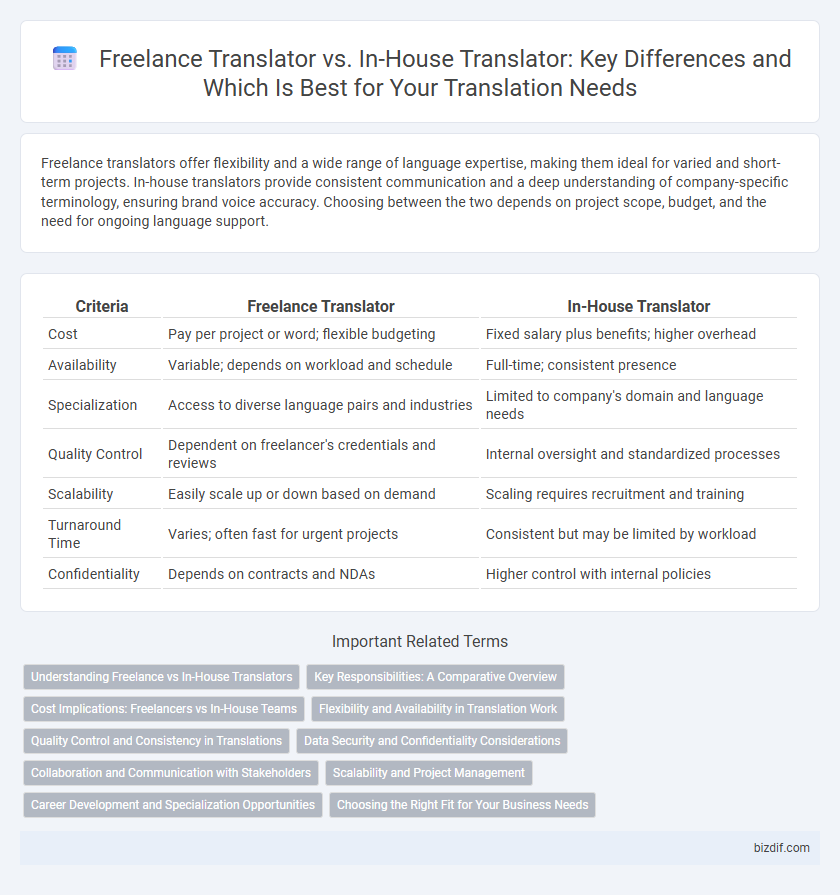Freelance translators offer flexibility and a wide range of language expertise, making them ideal for varied and short-term projects. In-house translators provide consistent communication and a deep understanding of company-specific terminology, ensuring brand voice accuracy. Choosing between the two depends on project scope, budget, and the need for ongoing language support.
Table of Comparison
| Criteria | Freelance Translator | In-House Translator |
|---|---|---|
| Cost | Pay per project or word; flexible budgeting | Fixed salary plus benefits; higher overhead |
| Availability | Variable; depends on workload and schedule | Full-time; consistent presence |
| Specialization | Access to diverse language pairs and industries | Limited to company's domain and language needs |
| Quality Control | Dependent on freelancer's credentials and reviews | Internal oversight and standardized processes |
| Scalability | Easily scale up or down based on demand | Scaling requires recruitment and training |
| Turnaround Time | Varies; often fast for urgent projects | Consistent but may be limited by workload |
| Confidentiality | Depends on contracts and NDAs | Higher control with internal policies |
Understanding Freelance vs In-House Translators
Freelance translators offer flexible scheduling and specialized expertise across multiple languages and industries, adapting quickly to diverse projects. In-house translators provide consistent brand voice and confidentiality, integrating closely with company teams for faster turnaround and tailored communication. Choosing between freelance and in-house translators depends on factors like budget, volume, project complexity, and the need for ongoing collaboration.
Key Responsibilities: A Comparative Overview
Freelance translators manage diverse projects independently, offering flexibility in specialization and workload, whereas in-house translators focus on consistent company needs, ensuring brand voice and terminology uniformity. Freelancers often handle multiple clients, requiring self-discipline in project management and client communication, while in-house translators collaborate closely with internal teams for seamless integration and quicker revisions. Both roles demand linguistic accuracy and cultural adaptation, but the scope and operational dynamics differ significantly in daily responsibilities.
Cost Implications: Freelancers vs In-House Teams
Freelance translators often present lower overall costs due to flexible project-based pricing and the absence of employee benefits, reducing fixed expenses for companies. In-house translator teams incur higher costs through salaries, benefits, workspace, and training, but offer consistent availability and greater control over quality. Businesses must balance budget constraints with project demands when choosing between cost-effective freelancers and the stable investment of an in-house translation team.
Flexibility and Availability in Translation Work
Freelance translators offer unmatched flexibility and availability, often working across multiple time zones to meet tight deadlines and adapt to varying project demands. In-house translators provide consistent access during regular business hours, ensuring immediate collaboration and integration within the company's workflow. Choosing between freelance and in-house translation depends on the need for 24/7 availability versus structured, team-centered work environments.
Quality Control and Consistency in Translations
Freelance translators offer flexibility but may present challenges in maintaining consistent quality control across diverse projects due to varying workflows and standards. In-house translators benefit from integrated quality control systems, ensuring uniform terminology, style, and accuracy aligned with company standards. Implementing centralized glossaries and regular team reviews enhances consistency and mitigates risks of discrepancies in translation output.
Data Security and Confidentiality Considerations
Freelance translators often use personal devices and networks, raising concerns about data security and confidentiality compared to in-house translators who typically operate within secured company environments with controlled access protocols. In-house translators benefit from direct supervision and strict adherence to organizational data protection policies, reducing the risk of information breaches. Freelance professionals may implement Non-Disclosure Agreements (NDAs) and encrypted communication tools, but the decentralized nature of their work requires rigorous security measures to safeguard sensitive client information.
Collaboration and Communication with Stakeholders
Freelance translators offer flexible collaboration, often utilizing digital tools to maintain seamless communication with diverse stakeholders across various time zones. In-house translators benefit from direct, real-time interaction with internal teams, fostering deeper understanding of company-specific terminology and immediate feedback loops. Effective communication in both roles hinges on clear expectations, prompt responses, and the use of collaborative platforms to ensure translation accuracy and project alignment.
Scalability and Project Management
Freelance translators offer high scalability by easily adjusting their workload based on project demands, making them ideal for fluctuating translation volumes. In-house translators provide more consistent availability and streamlined project management through direct communication and integration with internal teams. Effective project management tools enhance collaboration for both options, but freelancers require robust coordination to maintain quality and deadlines across diverse projects.
Career Development and Specialization Opportunities
Freelance translators benefit from diverse projects across multiple industries, enhancing specialization in niche fields such as legal or medical translation while building a versatile portfolio that accelerates career growth. In-house translators often receive structured training and stable workflow, supporting deep expertise development within a specific sector and facilitating steady career progression within a single organization. Both paths offer unique advantages for career development, with freelancers gaining varied experience and in-house translators benefiting from consistent specialization opportunities.
Choosing the Right Fit for Your Business Needs
Freelance translators offer flexibility and access to specialized language skills on demand, making them ideal for projects with varying workloads or niche industries. In-house translators provide consistent quality control, enhanced collaboration, and a deeper understanding of the company's brand voice, suitable for businesses with ongoing, high-volume translation needs. Evaluating factors such as budget, project scale, confidentiality requirements, and linguistic expertise helps determine whether a freelance or in-house translator best supports your business goals.
Freelance Translator vs In-House Translator Infographic

 bizdif.com
bizdif.com